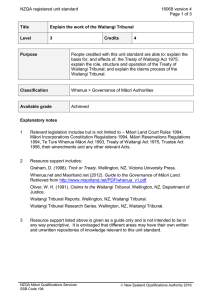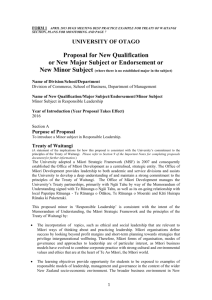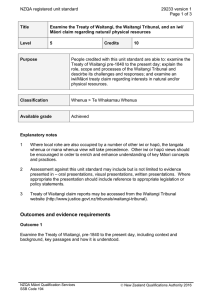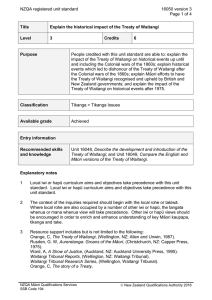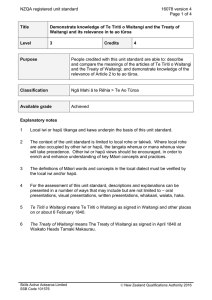NZQA registered unit standard 23093 version 3 Page 1 of 4
advertisement
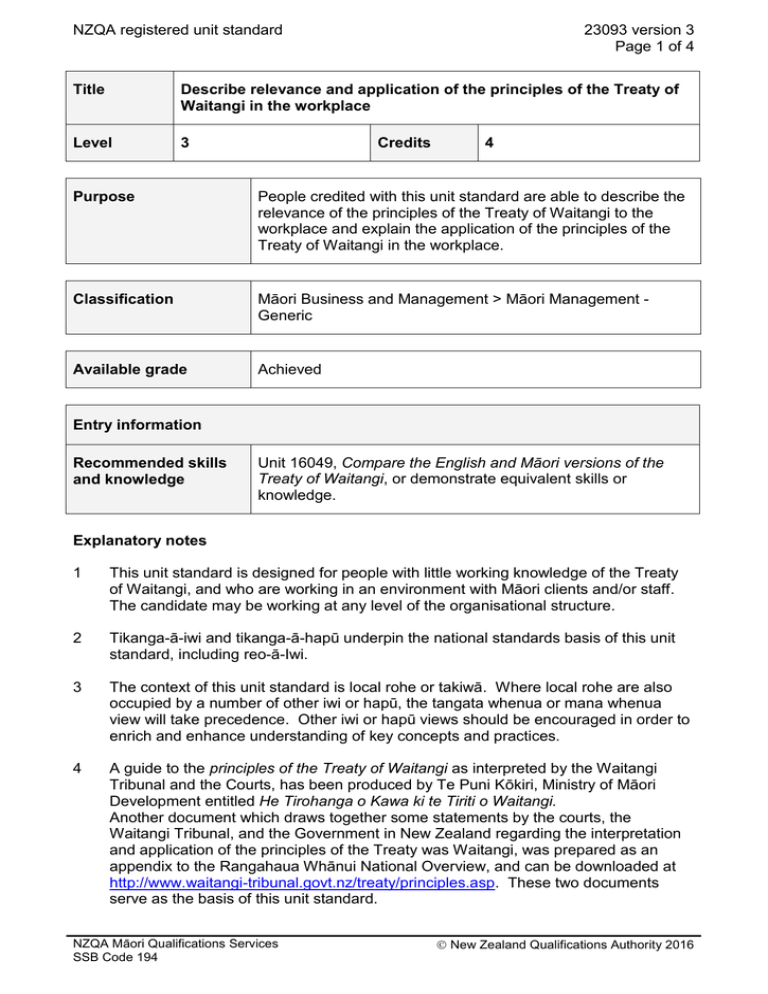
NZQA registered unit standard 23093 version 3 Page 1 of 4 Title Describe relevance and application of the principles of the Treaty of Waitangi in the workplace Level 3 Credits 4 Purpose People credited with this unit standard are able to describe the relevance of the principles of the Treaty of Waitangi to the workplace and explain the application of the principles of the Treaty of Waitangi in the workplace. Classification Māori Business and Management > Māori Management Generic Available grade Achieved Entry information Recommended skills and knowledge Unit 16049, Compare the English and Māori versions of the Treaty of Waitangi, or demonstrate equivalent skills or knowledge. Explanatory notes 1 This unit standard is designed for people with little working knowledge of the Treaty of Waitangi, and who are working in an environment with Māori clients and/or staff. The candidate may be working at any level of the organisational structure. 2 Tikanga-ā-iwi and tikanga-ā-hapū underpin the national standards basis of this unit standard, including reo-ā-Iwi. 3 The context of this unit standard is local rohe or takiwā. Where local rohe are also occupied by a number of other iwi or hapū, the tangata whenua or mana whenua view will take precedence. Other iwi or hapū views should be encouraged in order to enrich and enhance understanding of key concepts and practices. 4 A guide to the principles of the Treaty of Waitangi as interpreted by the Waitangi Tribunal and the Courts, has been produced by Te Puni Kōkiri, Ministry of Māori Development entitled He Tirohanga o Kawa ki te Tiriti o Waitangi. Another document which draws together some statements by the courts, the Waitangi Tribunal, and the Government in New Zealand regarding the interpretation and application of the principles of the Treaty was Waitangi, was prepared as an appendix to the Rangahaua Whānui National Overview, and can be downloaded at http://www.waitangi-tribunal.govt.nz/treaty/principles.asp. These two documents serve as the basis of this unit standard. NZQA Māori Qualifications Services SSB Code 194 New Zealand Qualifications Authority 2016 NZQA registered unit standard 5 23093 version 3 Page 2 of 4 Definitions Workplace for the purpose of this unit standard, does not just refer to an office, but refers to any context or setting in which the candidate is operating while performing tasks or duties specified by work. Working with tangata whenua takes place in a variety of settings. People must have an awareness, not only of the tikanga pertaining to Māori people in general, but also the specific tikanga applying to the iwi and rohe-ā-takiwā in which they are working. People must be able to recognise language variations, differences in kawa and tikanga, and be aware of waiata pertaining to certain iwi and rohe-ā-takiwā. Principles of The Treaty of Waitangi include: Protection – Considered primarily in regard to the property interests guaranteed to Māori under Article II of the Treaty Active duty ie more than a passive obligation or recognition of right Extent of obligation depends on prevailing circumstances and vulnerability of the taonga in question Located in the fundamental exchange recorded in the Treaty - the cession of sovereignty for the guarantee of tino rangatiratanga Broad interpretation arising from the entire text of the Treaty: – a duty to protect Māori as a people and as individuals, in addition to their property – Crown’s duty to actively protect tino rangatiratanga and Māori capacity to retain tribal authority over tribal affairs and to live according to their cultural preferences – Crown cannot avoid its duty by delegating its responsibility to local authorities or other bodies. Partnership – The Treaty relationship is ‘akin to a partnership’ Includes duties of good faith, reasonableness, and the honour of the Crown The Treaty partnership does not necessarily describe a relationship where the partners share national resources equally Derived from the principles of reciprocity and of mutual benefit Includes the obligation on both parties to act reasonably, honourably, and in good faith Emphasises the need for recognition, respect, accountability, compromise, and a balancing of interests. Participation – An aspect of the obligation to act in good faith The duty to consult is not absolute Consultation is required on truly major issues Consultation should be conducted with ‘open-mindedness’ and ‘sufficient information’ to enable ‘intelligent and useful responses’ Emphasises the value and utility of consultation in upholding and strengthening the Treaty partnership Consultation required on matters that infringe on tino rangatiratanga The degree and type of consultation required in a given instance may vary depending on what is needed for the Crown to make an informed decision Consultation processes should take into account Māori preferences. NZQA Māori Qualifications Services SSB Code 194 New Zealand Qualifications Authority 2016 NZQA registered unit standard 23093 version 3 Page 3 of 4 Outcomes and evidence requirements Outcome 1 Describe the relevance of the principles of the Treaty of Waitangi to the workplace. Range includes but is not limited to partnership, protection, participation. Evidence requirements 1.1 The relevance of the principles of the Treaty of Waitangi is described in terms of the workplace. Outcome 2 Explain the application of the principles of the Treaty of Waitangi in the workplace. Range includes but is not limited to partnership, protection, participation. Evidence requirements 2.1 The explanation identifies how the principles of the Treaty of Waitangi are currently applied in the workplace in terms of practices and processes. Range 2.2 two examples required - one practice and one process. The explanation identifies how the principles of the Treaty of Waitangi can be applied to the workplace in terms of new and practices and processes. Range two examples required - one practice and one process. Planned review date 31 December 2016 Status information and last date for assessment for superseded versions Process Version Date Last Date for Assessment Registration 1 25 October 2007 N/A Rollover 2 27 April 2012 N/A Rollover 3 18 June 2015 N/A Consent and Moderation Requirements (CMR) reference 0113 This CMR can be accessed at http://www.nzqa.govt.nz/framework/search/index.do. Please note Providers must be granted consent to assess against standards (accredited) by NZQA, before they can report credits from assessment against unit standards or deliver courses of study leading to that assessment. NZQA Māori Qualifications Services SSB Code 194 New Zealand Qualifications Authority 2016 NZQA registered unit standard 23093 version 3 Page 4 of 4 Industry Training Organisations must be granted consent to assess against standards by NZQA before they can register credits from assessment against unit standards. Providers and Industry Training Organisations, which have been granted consent and which are assessing against unit standards must engage with the moderation system that applies to those standards. Requirements for consent to assess and an outline of the moderation system that applies to this standard are outlined in the Consent and Moderation Requirements (CMR). The CMR also includes useful information about special requirements for organisations wishing to develop education and training programmes, such as minimum qualifications for tutors and assessors, and special resource requirements. Comments on this unit standard Please contact the NZQA Māori Qualifications Services mqs@nzqa.govt.nz if you wish to suggest changes to the content of this unit standard. NZQA Māori Qualifications Services SSB Code 194 New Zealand Qualifications Authority 2016



